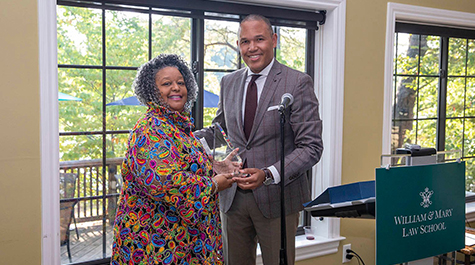Judge Helivi Holland ’90 Presented with Annual St. George Tucker Award
On Friday, August 26, Judge Helivi Holland ’90 received the annual St. George Tucker Adjunct Professorship Award during a reception celebrating the start of the 2022-23 school year at William & Mary Law School.
The award recognizes an outstanding member of the Law School’s adjunct faculty for service on behalf of students, and is selected by nomination from the Law School Community.
Holland is a district court judge for the 5th Judicial District in Virginia. She was elected to the court by the Virginia General Assembly on February 23, 2021, and assumed that April. Her current term ends in 2027.
Prior to becoming a judge, Holland served as Suffolk City attorney, the first African American to hold that position. In the Suffolk city attorney’s office, Holland represented Suffolk Department of Social Services and Child Welfare cases and Juvenile Domestic Relations District Court. Before that, she directed the Virginia Department of Juvenile Justice. Earlier in her career, she served as a prosecutor for the Commonwealth of Virginia.
Holland’s work as a prosecutor earned her the Virginia Department of Criminal Justice’s Victim Assistance Award and the NOBLE National Lloyd Sealy Award and the Community Service Civil Services Award for the Commonwealth of Virginia. She was also elected president of the Old Dominion Bar Association.
“Simply put, Judge Holland’s work represents the very embodiment of the citizen lawyer ideal that we instill at the Law School,” said A. Benjamin Spencer, Dean and Trustee Professor. “On top of all that, she not only has an accomplished professional career, but she spends an enormous amount of time giving back to her community and even finds time to help us educate and inspire young lawyers to follow in her footsteps.”
Spencer also shared thoughts from some of Holland’s students in her Juvenile Law class.
“They report that they learn a tremendous amount from her,” Spencer said. “They really appreciate the time that she puts into preparation for class.”
That preparation includes adding value by bringing in guest speakers, providing real-world understanding of the juvenile justice system, and offering practical perspective on how the law affects the most vulnerable citizens.
“Our students see this as an invaluable part of their legal education,” Spencer said. “So we’re very grateful for her contributions to our community. I can't think of a better person to honor with this award.”
In addition to honoring Judge Holland, the event allowed the William & Mary Law community to officially kick off the new academic year. Dean Spencer thanked adjuncts, full time faculty, staff and everyone for their hard work throughout the pandemic, both remotely and in hybrid fashion.
“It was really remarkable that we were able to keep operations going and continue to educate people and graduate them,” Spencer said. “I haven’t had the chance to see all of you in person together to thank you for that, but thank you—hat’s off—I really appreciate it.”
***
St. George Tucker (1752-1827), the second professor of law at William & Mary, succeeded George Wythe on the faculty and was a pioneer in legal education. He drafted a formal description of the requirements for a law degree at the College, which included an exacting schedule of qualifying examinations in subjects such as history and government. Tucker’s course material was published in 1803 as the first American edition of Blackstone’s Commentaries. For much of the early 19th century, this volume was considered the leading authority on American law. Tucker was also a distinguished judge, serving on both the state and federal benches for more than 30 years.
About William & Mary Law School
Thomas Jefferson founded William & Mary Law School in 1779 to train leaders for the new nation. Now in its third century, America’s first law school continues its historic mission of educating citizen lawyers who are prepared both to lead and to serve.
